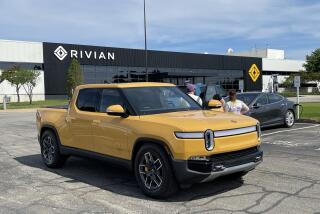Isuzu to Cut More Than a Third of U.S. Staff
- Share via
Struggling American Isuzu Motors, already in a downward spiral marked by slumping sales, layoffs and asset divestitures, is preparing to fire more than a third of its remaining U.S. staff by the end of the year.
About 150 of the company’s 400 employees will be laid off over the next two months, Isuzu employees at the company’s North American headquarters in Cerritos were told this month. A company spokesman confirmed the plan Wednesday but declined to comment.
The move is part of a last-ditch effort to save the 21-year-old company, which helped introduce the sport utility vehicle to the North American market but failed to capitalize on its tremendous popularity.
Some auto industry analysts say that saving Isuzu is a near-impossible task.
“I’ve seen sicker dogs get well, but it is not likely in this case,” said truck industry specialist Jim Hossack, senior consultant at Tustin-based AutoPacific Inc.
Isuzu’s Japanese parent, Isuzu Motors Ltd., is primarily a commercial truck and diesel engine manufacturer and has been battered by the slumping Japanese economy, in which demand for its large trucks has dropped 60% or more in the last two years. As a result, the company has ended what little support it had been giving its U.S. offspring.
Additionally, General Motors Corp., which has invested heavily in Isuzu in order to benefit from its diesel engine expertise, has publicly questioned the need for the company to sell sport utility vehicles in the U.S. -- often in direct competition with GM products -- and has slashed its investment in Isuzu Motors from a 49% stake to 12%.
“They just don’t have the capital” to compete, said Burnham Securities auto industry analyst David Healy. “It has been the case for a while now with the Japanese vehicle companies. The rich are getting richer and the poor are getting poorer.”
Isuzu’s U.S. sales fell more than 35% from their peak in 1986 through the end of last year and are off 38% for the first 10 months of this year compared with the same period in 2001; 2002 is on track to be American Isuzu’s worst year since 1983.
In an attempt to conserve resources and amass a little capital, Isuzu last month agreed to sell its share of a joint-venture U.S. manufacturing plant, Subaru-Isuzu Automotive Inc., to Subaru’s parent, Fuji Heavy Industries Ltd. The company also sold to GM controlling interest in its U.S. diesel engine plant in Marion, Ohio, and in a small diesel plant in Poland.
Many industry watchers have taken the deals as a signal that Isuzu plans to withdraw from the passenger vehicle market in the U.S., although terms of the acquisition of the manufacturing facility call for Subaru to continue building about 30,000 vehicles for Isuzu to sell through its 495 U.S. dealerships.
Isuzu got into the SUV market almost by accident. It began sales in the U.S. in 1981 with a small pickup, added passenger cars the next year, and in 1984 gave dealers a small utility vehicle to see if they could use it to help augment their incomes. At the time, SUVs were, at best, a niche product, and the only competition was from Jeep.
But the SUV took off -- Isuzu started selling sport utilities just as American car buyers started looking for alternatives to minivans and station wagons -- and car sales started dwindling. American Isuzu stopped selling cars in 1993 and became the “all-SUV” company.
“But they were not experienced in marketing in the competitive U.S. truck market,” Hossack said. “They grew by luck and by the help of one really good set of commercials, at a time the U.S. sport utility market was growing like crazy.”
That set of commercials was the original “Joe Isuzu Liar” campaign that ran from 1986 through 1989 and helped triple Isuzu’s name recognition among car shoppers. The Joe Isuzu character -- who made outrageous claims about the company’s products then announced with a grin that he was lying -- was resurrected last year but failed to gain the same traction.
Since its advertising heyday in the late 1980s, Isuzu’s U.S. marketing budget has been steadily chipped away, and the company’s name recognition has plummeted.
Ironically, it was Isuzu’s early success with SUVs such as the Rodeo and Trooper that helped hasten its troubles.
“They were doing so well ... that they drew the attention of the big guys, like Toyota and Honda and Nissan, and those guys studied the U.S. market and came in with real game plans,” Hossack said. “Isuzu is a very good commercial truck maker, but it was an amateur in the U.S. light truck market 15 years ago, and it is still an amateur.”






